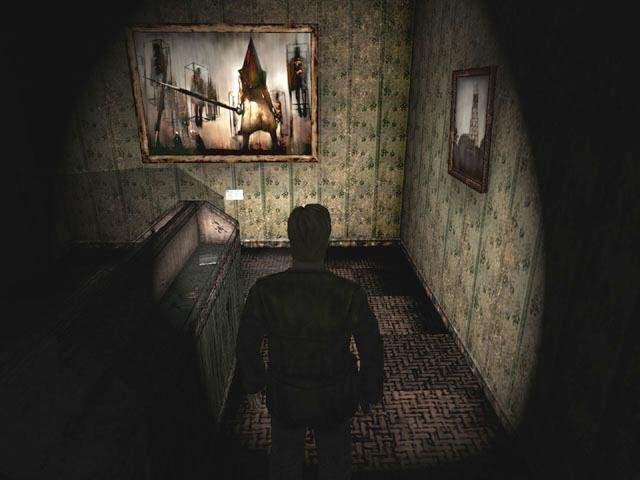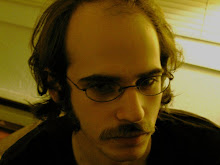
(This article contains a major Silent Hill 2 spoiler. Read at your own risk if you haven't already completed the game.)
I'm sorry, internet. I know Silent Hill 2 is something of a sacred cow in "games as art" circles with its rich, complex themes of guilt, anger, and sexual repression, but I'm sorry, Silent Hill 2. I don't love you. You're just not very much fun to play.
I should probably preface this article by saying that I have beaten this game a few years ago (achieved the "water" ending), didn't really care for it, then read a lot of fascinating articles on why I was probably looking at it the wrong way, and decided to give it another shot.
I've written before that games needn't always be "fun" to be entertaining, something very much true of SH2. But, for me, SH2 is more than just "not fun," it's downright tedious. While the game may tell a deep, complex narrative with lots of brilliant symbolism that you can read about here, I feel like those elements are very separate from the actual experience of playing the game.
The game design, at its core, boils down to lots of arbitrary puzzles and combat that are both very poorly designed, in my opinion. The first "level" tasks you with exploring a series of apartment complexes. In order to progress, you need to solve some incredibly obscure puzzles whose placement makes absolutely no sense. You'll eventually reach a cabinet with a riddle inscribed in it tasking you to place a series of coins in the correct slots. The problem is that the game doesn't tell you how many coins you'll need, so it's more than likely that you'll be missing a hard to see piece, which can take ages of backtracking to scour for. Or worse, you'll have all the pieces already, but think that you're missing a piece, so you'll run around backtracking looking for something that isn't even there.
This problem is compounded by one of the games absolutely biggest flaws: items are way too hard to see. Damn near invisible, if you ask me. Your character will move his head towards points of interest, but it's still unclear just where he's looking exactly. This problem is made much worse by the fact that you can examine a ton of stuff, but only interact with a small portion of it, and you need to be lined up exactly right to examine what you want. Here's a good example: early in the game you find a shopping cart with a handgun in it. My character was looking at the cart, so I went up to examine it. He commented on the cart, but said nothing of the gun sitting right there inside of it. I must have walked around the cart and hit the "examine" button no less than eight times before he finally picked up the goddamned gun. In a game already as dark as Silent Hill 2, this is a very, very bad thing. Ultimately, it comes down to a matter of clicking on everything and hoping you'll uncover a camouflaged point of interest. While it may have broken the immersion a bit to make the items glow like they do in Resident Evil or Bioshock, it also would have made the game about ten times more playable. Since the levels are so vast and sprawling and mandatory items so hard to see, it can often feel like a game about searching for your car keys. Not my idea of a good time.
I also think not letting you examine everything would make things more immersive, because it would allow us to form our own interpretation. Do we really need to hear James think that "this bed is filthy. It probably hasn't been washed in weeks." Some intuition you got there, James. That's just poor writing if you ask me. These games really need to learn to show, not tell.
Aside from the fact that the puzzles are just plain poorly designed with too few queues if you're on the right track, the fact that they exist at all seems at odds with the narrative. Not only do they not make logical sense (which is understandable, being that the whole game takes place in a surreal world made to manifest its protagonist's fractured psyche), I'm not entirely convinced that they tie into the narrative in any meaningful way. I fail to see what hunting down a bunch of keys has to do with a story of a man feeling guilty about murdering his wife.
There are other reasons the game isn't fun, as well. The combat, for example, is rubbish. That's kind of the point, I suppose, as it's something to be avoided. However, when they place you in a tiny room, compounded with a finicky camera and little room to maneuver, you'll be hard-pressed not to kill everything in sight as you continue your pixel-hunt. This problem is made worse with the games boss fights, which feel like they belong in an action game where you should be able to adequately dodge and fight back, but you can't. The controls are so stodgy that you'll wind up merely trading blows for the most part. Which begs the question; if combat is something to be avoided, why do they even have mandatory boss fights in the first place? Le sigh.
Oh, and while I'm in full-on rant mode, I might as well mention how dreadful the voice-acting is. Given how the game's narrative is its saving grace, its shoddy voice-work threatens to undermine the whole experience. I can let it go to a point, as none of this is really happening, so it can be chalked up to its surreal dream-like world, but had the dialogue flowed a little more naturally it would have gone a long way towards making the drama more engaging, rather than just interesting to ponder about from afar.
The bits of story that are there are compelling, but I feel like I'm just slogging through a rudimentary series of poorly designed fetch quests in order to ascertain more juicy tidbits of narrative. In short, it's a game I enjoy reading and thinking about more than I do actually playing. It was worth going through once, for the experience. Though, I find it has not aged well in the least and is a prime example of mechanics and poor design getting in the way of narrative. I look forward to hearing why I, as per usual, am wrong.
